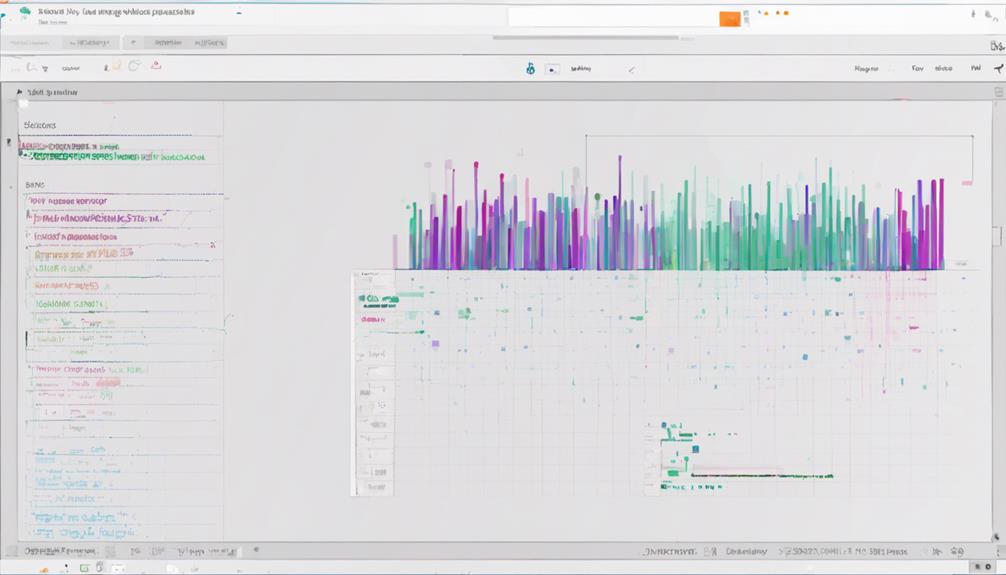You may not realize it, but the cleanliness of your data can significantly impact the success of your business operations. From ensuring accurate financial reports to optimizing marketing strategies, data scrubbing is important in maintaining the quality and reliability of your data assets. But did you know that beyond just accuracy, there are ten crucial reasons why data scrubbing is essential for your organization’s growth and sustainability? Let’s explore how this process goes far beyond mere error correction and can transform the way you leverage data for decision-making and strategic planning.
Enhanced Data Accuracy
Enhancing data accuracy is a critical aspect of data scrubbing. Through the process of data scrubbing, you can experience a myriad of benefits that contribute directly to the enhancement of accuracy within your datasets. One of the key advantages of data scrubbing is its ability to identify and rectify errors, inconsistencies, and duplications within your data. By cleaning and standardizing your data, you can ensure that it is accurate, reliable, and up-to-date.
Accuracy enhancement is crucial in data management as it directly impacts the quality of your analytics, reporting, and decision-making processes. By removing inaccuracies and inconsistencies through data scrubbing, you can trust that the insights derived from your data are precise and actionable. This precision not only improves the overall quality of your data but also enhances the credibility and reliability of your analyses.
Improved Decision Making
Clean data, free from errors and inconsistencies, is the bedrock for improved decision-making processes. When your data is accurate, decisions become more informed and reliable, leading to better outcomes. By ensuring data accuracy through scrubbing, you pave the way for enhanced analysis and strategic planning.
Data Accuracy Boosts Decisions
Why is data accuracy crucial for making informed decisions in today’s fast-paced business environment? Data quality plays a pivotal role in decision making processes. Inaccurate or outdated data can lead to flawed analysis and misguided decisions, ultimately impacting business performance. When data is scrubbed and accuracy is ensured, it provides a solid foundation for making informed choices that drive success.
Data accuracy boosts decisions by enhancing the reliability of the information you base your decisions on. Whether it’s financial projections, market trends, or customer preferences, having accurate data enables you to identify patterns, trends, and opportunities with confidence. By leveraging clean and precise data, you can make strategic decisions that are backed by reliable insights, increasing the likelihood of positive outcomes for your business.
In today’s competitive landscape, where agility and precision are key, the importance of data accuracy cannot be overstated. By scrubbing your data and ensuring its accuracy, you empower yourself to make well-informed decisions that propel your business forward.
Clean Data Aids Analysis
When dealing with the intricate realm of data analysis, the significance of clean data cannot be overstated. Clean data aids analysis by enhancing the accuracy and reliability of the insights derived. In the realm of data analysis, the quality of the data directly impacts the conclusions drawn and decisions made.
Data analysis relies heavily on the integrity of the data being processed. Clean data ensures that the analysis is based on accurate information, leading to more precise results and informed decision-making. By scrubbing data and removing inconsistencies, errors, and duplicates, the quality of the dataset improves, enabling more effective analysis.
Moreover, clean data streamlines the analytical process, saving time and resources that would otherwise be spent on rectifying data issues. With clean data, analysts can focus on interpreting the information, identifying trends, and making strategic decisions based on reliable insights. Ultimately, investing in data quality through scrubbing processes enhances the efficacy of data analysis, leading to improved decision-making outcomes.
Ensuring Data Reliability
To ensure data reliability, it is crucial to focus on data accuracy assurance and implement error prevention measures effectively. By meticulously scrubbing data for accuracy and consistency, you can enhance the reliability of your datasets. These practices not only minimize errors but also contribute to making informed decisions based on trustworthy data.
Data Accuracy Assurance
Data Accuracy Assurance plays a crucial role in ensuring the reliability and integrity of your data. Through data validation and quality control processes, you can maintain accurate and trustworthy information within your databases. Data validation involves verifying the accuracy and consistency of data to ensure it meets specific criteria and standards. This step is essential in identifying any inconsistencies or errors that may compromise the reliability of your data.
Quality control, on the other hand, focuses on monitoring and maintaining the quality of data throughout its lifecycle. By implementing robust quality control measures, you can detect and rectify any inaccuracies or inconsistencies promptly, thereby enhancing the overall data accuracy. Ensuring data accuracy assurance not only improves the reliability of your data but also enables better decision-making, enhances operational efficiency, and boosts customer satisfaction. Therefore, investing in data accuracy assurance processes is paramount for organizations seeking to leverage their data effectively and drive strategic business outcomes.
Error Prevention Measures
Implementing robust error prevention measures is essential for ensuring the reliability and integrity of your data. When it comes to data cleansing and error detection, taking proactive steps can save you time and resources in the long run. Here are four key error prevention measures to consider:
- Regular Data Audits: Conduct frequent audits to identify and rectify any inconsistencies or inaccuracies in your datasets.
- Validation Rules: Implement validation rules to ensure that the data entered meets specific criteria, reducing the chances of errors at the point of entry.
- Automated Error Detection: Utilize automated tools to scan your data for anomalies, duplicates, and other errors, enabling swift identification and resolution.
- Employee Training: Provide comprehensive training to your staff on data entry best practices and the importance of accurate data to instill a culture of data quality within your organization.
Boosting Operational Efficiency
Enhancing operational efficiency is a vital aspect of any organization’s success. Data scrubbing plays a crucial role in boosting operational efficiency by ensuring increased productivity and streamlined processes. When your data is clean and accurate, your operations can run smoothly without interruptions caused by errors or duplications.
By implementing data scrubbing practices, you can eliminate redundant information, correct inaccuracies, and standardize data formats. This leads to a more efficient workflow, allowing your team to focus on essential tasks rather than wasting time on resolving data discrepancies. Increased productivity is a direct result of having reliable data at your fingertips, enabling quicker decision-making and execution of tasks.
Furthermore, data scrubbing helps in streamlining processes by providing a clear and consistent database that enhances communication and collaboration among different departments. With clean data, you can automate routine processes, reduce manual intervention, and prevent delays due to data errors. Overall, investing in data scrubbing is a strategic move towards optimizing your operational efficiency and achieving organizational success.
Facilitating Regulatory Compliance
Improving adherence to regulations is a critical component for organizations across various industries. When it comes to facilitating regulatory compliance through data scrubbing, there are several key reasons why this process is essential:
- Compliance Monitoring: Data scrubbing helps ensure that the information your organization holds meets regulatory standards, making it easier to monitor compliance with relevant laws and guidelines.
- Data Validation: By scrubbing your data, you can validate its accuracy and completeness, ensuring that the information used for regulatory purposes is reliable and up-to-date.
- Efficient Reporting: Clean and accurate data obtained through scrubbing facilitates the generation of reliable reports required for compliance monitoring, enabling organizations to demonstrate adherence to regulations effectively.
- Reduced Risk of Non-Compliance: Data scrubbing helps identify and rectify errors or inconsistencies in data, reducing the risk of non-compliance with regulatory requirements and potential penalties.
Strengthening Risk Management
Strengthening risk management through effective data scrubbing practices is imperative for organizations seeking to fortify their defenses against potential threats and vulnerabilities. By ensuring data quality is at its highest standard, organizations can significantly enhance their risk mitigation strategies. Data scrubbing plays a vital role in identifying and rectifying errors, inconsistencies, and inaccuracies within datasets. These errors, if left unaddressed, can lead to flawed decision-making processes, regulatory non-compliance, and increased exposure to cybersecurity risks.
Through robust data scrubbing procedures, organizations can proactively identify and eliminate duplicate records, outdated information, and incomplete data sets that could compromise the integrity of their risk management processes. By maintaining clean and reliable data, organizations can make more informed decisions, enhance their ability to predict and prevent potential risks, and ultimately strengthen their overall risk management framework. Prioritizing data quality through data scrubbing not only safeguards organizations against risks but also instills confidence in stakeholders regarding the accuracy and reliability of the information being utilized for risk management purposes.
Upholding Data Integrity
Maintaining data integrity is a critical aspect of efficient data management within organizations. Ensuring that your data remains accurate, consistent, and reliable is imperative for making informed decisions and fostering trust in your data-driven processes. Here are four key reasons why upholding data integrity through data scrubbing is crucial:
- Data Validation: Implementing data scrubbing techniques allows for the validation of data accuracy and completeness, ensuring that your data is reliable and error-free.
- Quality Control: By scrubbing your data regularly, you can maintain high-quality data standards, leading to improved overall data quality and integrity.
- Consistency: Data scrubbing helps in standardizing data formats, eliminating duplicates, and resolving inconsistencies, which are essential for maintaining data integrity.
- Compliance: Upholding data integrity through scrubbing ensures that your data complies with regulatory requirements, safeguarding your organization against potential risks and penalties.
Enhancing Business Intelligence
With the growing importance of data in decision-making processes, enhancing business intelligence has become a fundamental priority for organizations seeking to gain a competitive edge. By implementing effective data scrubbing practices, businesses can ensure that their business intelligence is based on accurate and reliable information. This leads to informed strategic decisions that drive business growth and provide a competitive advantage in the market.
Data scrubbing plays a crucial role in enhancing business intelligence by cleaning and organizing data to eliminate errors and inconsistencies. This process results in high-quality data that can be leveraged to identify trends, patterns, and insights that support business growth initiatives. Moreover, reliable data enhances the accuracy of forecasting models and trend analysis, enabling organizations to make proactive decisions that positively impact their bottom line.
Elevating Customer Satisfaction
To ensure customer satisfaction, data scrubbing plays a crucial role in enhancing data accuracy and improving marketing strategies. By cleaning and organizing your data effectively, you can target your audience more precisely, leading to personalized and impactful marketing campaigns. This attention to detail not only fosters trust and loyalty among customers but also boosts overall satisfaction levels.
Enhanced Data Accuracy
Ensuring data accuracy plays a pivotal role in elevating customer satisfaction levels. Enhanced data accuracy not only improves the quality of interactions but also boosts trust and loyalty. Here are four crucial reasons why accurate data enhances customer satisfaction:
- Data validation: By scrubbing and validating data regularly, you ensure that the information you have is current and reliable, leading to more accurate customer interactions.
- Error detection: Identifying and rectifying errors in your data through scrubbing processes helps prevent misinformation from reaching your customers, thus maintaining trust.
- Personalization: Accurate data allows you to tailor your interactions with customers, providing them with personalized experiences that meet their needs and preferences effectively.
- Timely communication: With clean and accurate data, you can reach out to customers promptly and with relevant information, leading to improved satisfaction levels and overall customer experience.
Improved Marketing Strategy
Improved marketing strategy is a key factor in elevating customer satisfaction levels. By utilizing data scrubbing to enhance marketing effectiveness, businesses can refine customer segmentation, leading to more personalized experiences. Clean data enables accurate customer profiling, ensuring that campaigns are optimized for maximum impact. With improved data quality, targeted messaging becomes more precise, resonating with customers on a deeper level.
Effective data scrubbing contributes to campaign optimization by ensuring that marketing efforts reach the right audience at the right time. By removing inaccuracies and redundancies from databases, businesses can tailor their marketing strategies to meet the specific needs and preferences of their customers. This level of customization not only increases the likelihood of conversion but also fosters stronger customer relationships.
Empowering Data-Driven Strategies
Amidst the ever-evolving landscape of business strategies, empowering data-driven approaches stands out as a crucial pillar for success. Leveraging data effectively can provide a competitive edge and unlock valuable insights that drive informed decision-making. Here are four key reasons why data scrubbing plays a vital role in empowering data-driven strategies:
- Enhanced Data Quality: By scrubbing and cleansing your data, you ensure that the information used for strategic decision-making is accurate, reliable, and up-to-date.
- Improved Decision-making: Clean data leads to more accurate analysis and insights, enabling you to make strategic decisions based on reliable information rather than assumptions.
- Personalized Customer Experiences: Data scrubbing helps in understanding customer behavior and preferences, allowing you to tailor your strategies to meet their specific needs effectively.
- Cost Efficiency: By maintaining clean data, you avoid costly errors and redundancies, ensuring that resources are utilized efficiently in driving data-driven strategies forward.
Frequently Asked Questions
How Does Data Scrubbing Impact Cybersecurity Measures?
Data accuracy is crucial in safeguarding against cyber threats. Data scrubbing enhances cybersecurity by ensuring clean, reliable data. It reduces vulnerabilities and strengthens defenses. Regular scrubbing minimizes risks and fortifies your digital fortress against potential breaches and attacks.
What Are the Common Challenges of Implementing Data Scrubbing?
Implementing data scrubbing presents challenges in ensuring data accuracy and achieving efficiency gains. You may face issues such as compatibility with existing systems and the need for specialized tools. Overcoming these hurdles can optimize your data management process.
Can Data Scrubbing Improve Marketing Campaign Performance?
Data scrubbing enhances data quality, refining your marketing campaigns. It assists in targeting the right audience, reducing wastage, and improving campaign optimization. By cleaning data regularly, you ensure efficient marketing strategies and better performance.
Are There Industry-Specific Benefits of Data Scrubbing?
In healthcare compliance, data scrubbing ensures accurate patient records. Financial accuracy benefits from clean data in auditing processes. Industry-specific benefits of data scrubbing are evident in healthcare and finance, where precision and regulatory adherence are paramount.
How Often Should Data Scrubbing Be Performed for Optimal Results?
To maintain data accuracy and comply with standards, you should scrub data regularly, like watering a plant for growth. Perform data scrubbing at least monthly to ensure optimal results and keep your database healthy.



